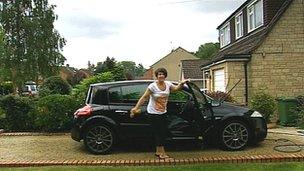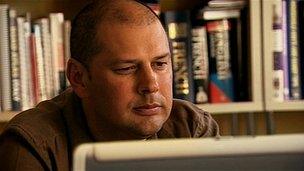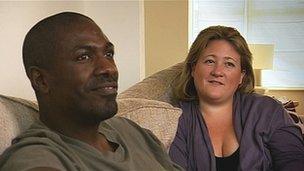Is £40,000 really a liveable income for families in the UK?
- Published
- comments
Monica and Bryan Adams lost £85,000 in a failed business venture and now owe £360,000 on their £310,000 house
The average income for a British family with two adults working is £40,000 a year. But while there are people who feel well-off living on this, for others it is a daily struggle.
"I try and buy myself a new-ish car every two years," says Kate Golding.
Cars are a particular weakness for Kate, a nurse who lives with her partner Jai Rossiter in Bristol.
"I could easily impulse buy a car," she admits.
Kate and Jai, an electrician, both own cars, putting them among the 30% of UK households owning two or more vehicles.
They own a £300,000 detached house, and say they feel "comfortable and stable" living on a combined income of £40,000. That is the average family income for a household with two people working, according to the Office for National Statistics.
"It sounds like a lot of money, you think 'my god I'm earning £40,000' but you're not really after tax," points out financial expert Alvin Hall.
"You need to have priorities to live off £40,000," he says, and with Kate that means cars.
She spends £10,000 every couple of years to buy a new car and likes to go on two or three package holidays a year.
"If you want your kids to go to private school you can't do that on £40,000," says Hall. "If you have to have everything in your house that is current, you can't do that on £40,000, so people need to set priorities."

Kate Rossiter manages to buy herself a "new-ish car every two years"
The 2011 Family Spending Survey, external shows households spent the largest proportion of their income on transport, rent, fuel and power, and recreation and culture.
There has been a fall in spending on clothing, health, recreation and restaurants, but a rise in spending on education, housing, water and electricity.
Many families will have relied on some kind of personal debt to get them through the year. But Kate is unusual in having no debt.
"I don't have a credit card. I haven't ever been overdrawn," says Kate. "I've had a loan once, £5000 for a car. I had the loan three months and I paid it off."
The average household debt (including mortgages) is £55,795 according to Credit Action, external, a national financial education charity.
"It doesn't matter if you have £10,000 or £100,000 a year if you spend more than your income that's when you get into trouble," says Paul Lewis, presenter of BBC Radio 4's Money Box.
"About half the population doesn't have debt," he says. "It tends to be older people, as they have finished paying their mortgages and don't aspire to go out and spend on things like holidays."
Kate and Jai do not have children, but Kate puts their large disposable income down to being good at financial management.
"I like the fact that I can manage my money, and a lot of my friends are in debt for whatever reason and never have any money left at the end of the month."
But financial expert Alvin Hall says you "don't need a lot of financial education to live well off of £40,000, it's just common sense".
Spending also depends on where you live in the country. In London, the South East, East, and South West of England, and Northern Ireland, spending for households is higher than the national average.
Houses prices in the south of England are much higher, the average house price in Greater London is £440,230, while in Blaenau Gwent in rural south-east Wales it is £88,163.
Monica and Bryan Adams live in Bournemouth where the average house price is £226,279 - around £15,000 less than the national average. But they owe £360,000 on their £310,000 house after getting into financial difficulties running their own business.
They have two children, Alexandra, who is eight, and Matilda, who is three, and describe their finances now as "tight" and "draining".
Their cafe failed after just eight months and they were made bankrupt after losing £85,000. The same thing happened to 4,242 other businesses in England and Wales in the last three months according to figures from Insolvency Direct, external.

Nevil Arthur spends a lot of time at his computer managing his elaborate accounting system
"I won't even buy a shop-bought pizza, that's £1.75 and I can make four pizza bases for that," says Monica.
Bryan now works for a utility company, and his wage - combined with tax credits and money from taking in lodgers - brings their income up to the national average of £40,000. After being made bankrupt they are not allowed credit cards.
"It's actually doing me good," asserts Monica. "It's teaching me to manage my money. If I haven't got the money I can't do it.
"I feel more pious for being able to now do that but I feel more stressed and worried. It's not as fun as slapping down a bit of plastic," she admits.
Average personal debt looks set to rise to £77,309 in the UK by 2015. David Cameron was criticised recently after a draft of a speech suggested that people should pay off their credit cards.
Virtual money pots
Nevil Arthur, a Eurostar train driver who lives in Ashford in Kent, believes he does not need lessons in money management.
"There's two ways of doing finance I think, the proactive approach and the reactive approach," he says.
"I believe that there's not many things in life that are actually surprises, so I try and allow a sum of money for replacing stuff or for how much things are going to cost."
He has devised his own elaborate and particular accounting system where he moves his wages into a "virtual pot system".
The pots can be for "food, entertainment, holidays, stationery, car maintenance, petrol, white goods", among other things, explains his wife Diana, a teacher.
This way of allocating funds used to be the norm, says Lewis.
"When people lived on cash wages that's exactly what they did. Cash is a physical thing and when it ran out at the end of the week that was it, you couldn't buy anything.
"Nowadays money is much more virtual, it's not a real thing. We use less and less cash and more and more plastic so we don't have that discipline to allocate money for different things."
A few years ago Nevil was diagnosed with cancer, which he is now in remission from, but even that did not cause him to overspend.
"I did have a brief spell when the BMW M5 was sort of beckoning to me... but I think I've been trying to be good with money for too long."
Gary and Sarah Francillia, who live in East Grinstead, West Sussex with their two boys Dominic and Joshua, know only too well how health issues can affect finances.
Dominic has been diagnosed with cerebral palsy and his parents want him to have a special operation that is only carried out in the US, which will cost £60,000.
Gary is a sergeant in the Metropolitan Police and Sarah is a part-time manager for a travel company. They both owed around £20,000 when they met 10 years ago, which they are still paying off.
Carrying forward consumer debt is "spending the future you haven't earned yet", says Hall.
"It's a ticking time-bomb. At some point something will go wrong and you'll have to pay it all back."
But he understands a sick child is something that overrides all other priorities.

Gary and Sarah Francillia refuse to worry about their debts
"It eats away at me every day," says Sarah. "So what we've got some debt? What does it matter? We'll deal with it. We have bigger priorities."
While those living on the average household income of £40,000 might be struggling with budgeting or debt, Hall believes they are much more careful with their spending than those on much higher incomes.
He believes they "repress their spending urge" but that goes out the window when people hit a certain income.
"Once people get up to six figures something happens to them," he says.
"All of a sudden they see themselves as rich and they want to have the signifiers of being rich, they want to shop at Gucci.
"People think they are released from what they see as the need to set priorities. They think they shouldn't have to think about money and when that mindset sets in, watch out."
- Published29 November 2011
- Published21 November 2011
- Published31 August 2011
- Published29 June 2011
- Published28 June 2011
- Published10 April 2011